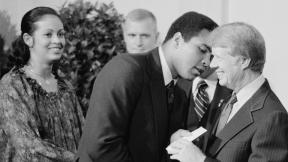
While leaders and organizations have their role to play, individuals are key to promoting a better understanding of Islam and Muslims, as well as protecting Muslims from harassment and attacks. This has already been seen in many, many cities, where non-Muslims have expressed support for their Muslim neighbors in different ways. There are many refefrences one can find in Hadith and Quran about neighbors nd their rights and how to treat your neighbors. Here are some ways you can help:
1. Get to know your Muslim neighbors
Ask them what they believe in and practice. What is Jihad? Ask any question which you might have. Most Muslims are willing and even enthusiastic about sharing information about Islam with others, but they may feel shy to initiate a conversation about their beliefs. Let this be an opportunity to learn more about your neighbor and over 1 billion human beings who share his or her faith.
2. Protest media bias
Call in to talk shows and write letters to the editor to your local newspaper about the danger of generalizations and stereotyping Muslims.
In particular, protest the use of the terms "Islamic terrorist" or "Islamic terrorism". Stress to listeners and/or readers that we would never tolerate terms like "Christian/Jewish terrorist" or "Christian/Jewish terrorism". Similarly, we should not tolerate such a slur about the faith of one-fifth of humanity. Would they describe David Duke as a Christian terrorist? Or Timothy McVeigh? You can also mention how President George W. Bush has made it clear that his desire to strike back is not at Islam but at the perpetrators of the crime.
3. Call your congressperson
If you've never contacted him or her before, remember that they represent you and your concerns. Ask them to issue a statement calling on Americans not to make dangerous generalizations about the Muslim-American community. The statement should also express support for the Muslim community in these trying times.
4. Discuss the harm of generalizations and stereotypes
This is something you can do within your own family. During dinner, discuss the danger of generalizing about all people, with a special focus on Muslims. For instance, you can mention that it was by assuming that all Muslims are the stereotypical terrorist that they had to suffer so much mistreatment and harassment in America (and they still are). Get even the youngest children in on your discussion so they can learn, from an early age, how harmful stereotypes about people are.
5. Use that globe or map
If your world map or globe has been sitting on a shelf collecting dust, take it down and use it as a tool to teach your family the diversity and breadth of Islam. Show them which countries make up the Muslim world and explain that although there is great diversity of race, culture, ethnicity and language, Muslims are united by a common faith that spans the globe.
6. Contact a local mosque or Islamic center
Turn to the oft-neglected religion section of your newspaper or telelphone book and look for the nearest mosque. Fire up your courage by calling them up and asking them if they have any events being held in relation to the September 11 tragedy. If, for, instance, they're organizing a prayer vigil, attend the event with your family.
If they don't have any events, ask if you and your family can come to get a tour of the mosque. Explain that you are simply a non-Muslim neighbor who would like to get a better understanding of Islam.
7. Donate through the mosque
If a local mosque or Islamic center is collecting funds for the victims of the September 11 terrorist attacks, why not donate through them instead of your church or religious organization? The money is going to the same place anyway, and this could be an expression of good will on your part towards your Muslim neighbors.
8. Invite them to your church
Invite your Muslim neighbor to your church or religious organization. Tell them what people in your congregation have been asking about Islam and Muslims and ask your neighbor if they would be willing to answer questions about this. If so, this is a great learning opportunity for you and your church or religious group.
9. Watch videos that share what Islam is all about
Watch videos with your family that talk about Islam from a Muslim perspective. Two that can be very useful are Islam: A Closer Look, which features interviews with Muslims about some basic aspects of their faith, and Hijab: An Act of Faith, a documentary about the Muslim women's dress, especially the head scarf and loose clothes which have gained so much prominence and attention in these last few weeks.
10. Plan a block party
During these last days of warm weather left, why not plan a block party? This is a great way for neighbors to get to know each other and share common concerns. It's also a way to get your Muslim neighbor or neighbors to come out and get to know the community and vice-versa.
These are just some ideas of what you can do to express sympathy and support at this difficult time for all Americans. Some have already taken steps that have been greatly appreciated in the Muslim community.
For example, some Non-Muslim neighbors have offered to shop for their Muslim neighbors, especially Muslim women, who have either been kicked out of grocery stores for the way they dress in some very small cases, or have been too afraid to do the shopping for fear of being harassed.
Some non-Muslim women have donned headscarves for a day as a gesture of support for Muslim women who cover and who have been the target of mistreatment.
Others have contacted mosques and other Islamic institutions to offer support and sympathy. In some cases, non-Muslim neighbors have surrounded a mosque in support of the Muslim community and against threats of some non-Muslims.
A number of non-Muslims have attempted to engage in positive dialog with other neighbors who have expressed hateful, angry sentiments during pro-USA and anti-Arab demonstrations in some neighborhoods across the country.








Comments
Great site for non Muslim to learn about religion, culture
Location
Add new comment